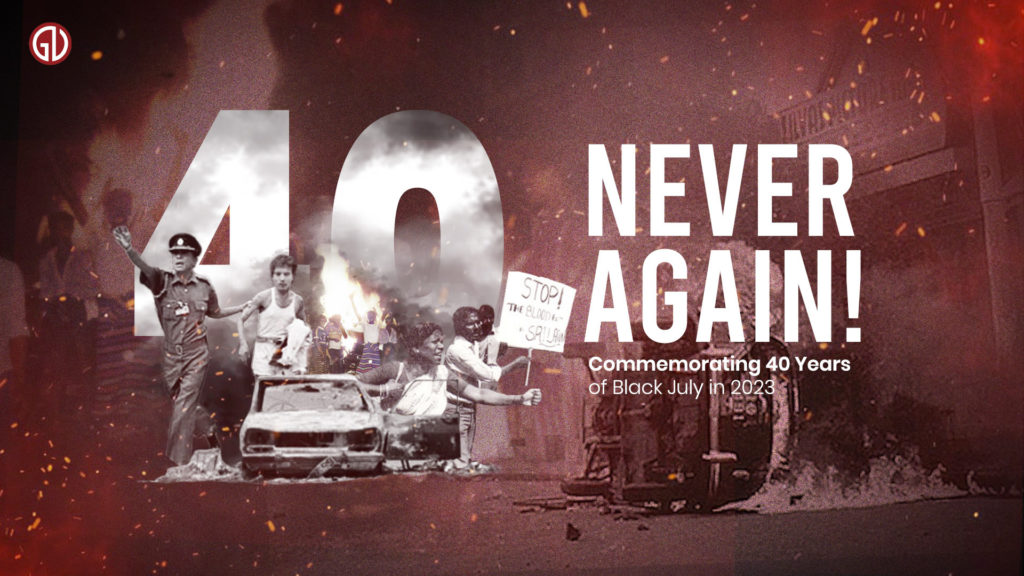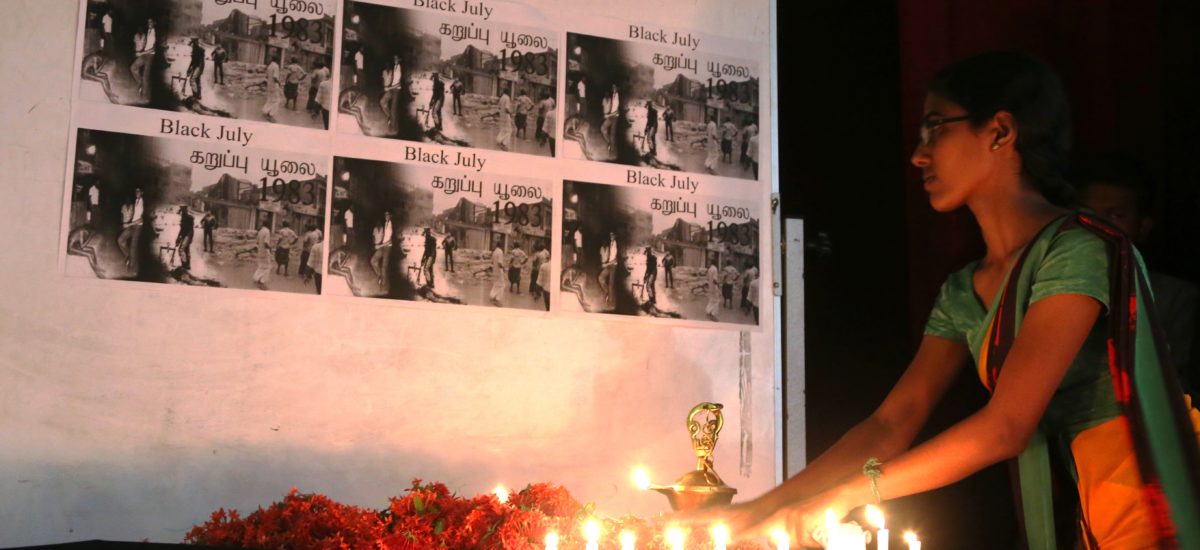Photo courtesy of oneislandtwonations
It was July 25, 1983 – that fateful day, which altered the trajectory of my life forever.
Growing up in Colombo, we had come to accept the sad fact that ethnic conflicts will occur whenever politicians fanned the flame of hatred toward minorities to deflect responsibility for their corruption and poor governance. The minorities were convenient scapegoats for all the ills of the country.
Since our home was located in a bucolic neighborhood of Colombo, on a beautiful tree lined street in the midst of upper middle class professionals, we mistakenly believed we were safe from the mob and hooligans who periodically went on the rampage burning pillaging and raping minorities living in less advantaged localities
I was living with my parents in July 1983, with two young children. We were about to sit down to lunch when we received several calls to say that there was a commotion in certain parts of Colombo and we were asked not to leave the house. We soon learned that the mob had been unleashed in the city to attack Tamil home and shops, setting fire to vehicles and homes. We saw black smoke billowing from homes set on fire, helicopters flying overhead and the telephone lines were jammed; we began to panic. Our house was down a long driveway and we knew that there was no escape route if the mob came to our home. One option was to jump over a tall concrete wall on to our neighbor’s garden but we knew my elderly mother could not do it.
Suddenly our domestic help screamed, “They have come, run and hide.” I grabbed my kids, my sister gathered my mother and rest of the staff and we ran into the closest bathroom and locked the door. We were the only Tamils on that street. They had found us, our name and address was on a list in the hands of the mob. My mother was quietly sobbing; I was trembling from head to toe and prayed that whatever they did to us let it be quick and painless. We had heard from past events that typically the mob would siphon petrol from the car in the garage, set fire to the car and then douse gasoline on the house and set it aflame. We were paralyzed with fear, waiting to hear the car go up in flames. My sister suggested she meets the mob at the front door and pretend she is Sinhalese and that the Tamil family that lived in that house had vacated. She spoke fluent Sinhalese and felt she should at least give it a shot. I refused to let her confront the mob alone, so we held hands and walked down the hallway to the front door. My knees were wobbling; I felt faint but was resolute. We stood waiting for the mob to appear, for what appeared to be an eternity, when the young woman who announced the arrival of the mob came running down the driveway to say that the mob had gone away.
Our Sinhalese neighbors and friends saved us. They met the mob, convinced them that the house was empty, that the Tamil family had moved. They proceeded to persuade them to leave by giving in to their demands, namely, cash and liquor. Thereafter, our neighbors arranged for someone to stay the night with us, provided us with groceries since traders were afraid to serve Tamil customers and helped us house and protect many other families we took in during that period.
On full display were hatred, violence and bigotry while also showcasing the essence of human kindness, selfless generosity and genuine friendship. The villains were, and are, the politicians who pit one ethnic group against another to divert attention from their corrupt governance and unbridled quest for power.
It was with a very heavy heart that I turned my back on the country of my birth, the country I wanted to give back to, that I returned to, to use my expertise to educate and enlighten a younger generation. I was filled with survivor guilt on many counts. My family was saved, many others perished. My family had options; we planned our exodus, while others were trapped to face an uncertain future. We were jumping ship, leaving behind the elderly, those who had held us and nurtured us, those who had no place to go. My grandmother could not make eye contact with me when I said goodbye. We were leaving those who saved us, those who we could have helped and support, as they grew old and feeble.
Several years later, while in New York, I called one neighbor who had been instrumental in dispersing the mob as he lay in his hospital bed in Colombo, at the end of his life. I told him I was sorry we were not physically there with him at that time, I told him how grateful we were for his friendship and begged him to understand why we had to leave. He said nothing and that said everything to me. He never got over his sadness in seeing us leave. This was the depth of friendship between the races; we were one until we were brutally torn apart.


